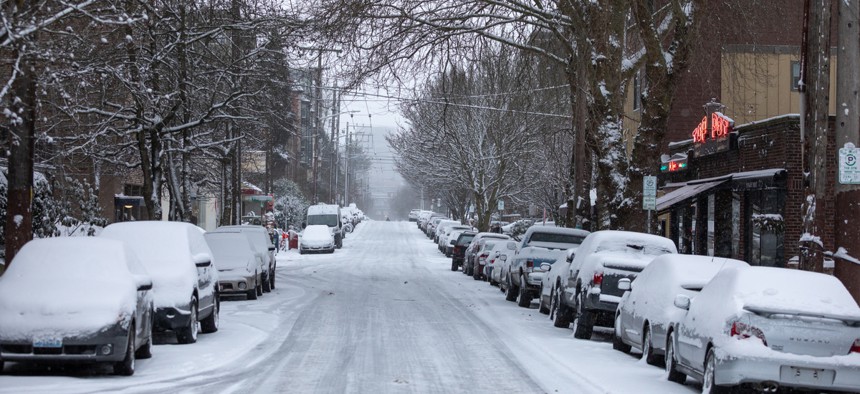Seattle Mayor Won’t Sign Legislation Banning Winter Evictions, But It Becomes Law Anyway

Seattle Mayor Jenny Durkan refused to sign legislation passed earlier this month by the city council that limits evictions for low-income tenants during winter months, but allowed it to become law without her signature. Shutterstock
STATE AND LOCAL ROUNDUP | New Mexico enacts red flag gun legislation … Virginia establishes parole reforms … Massachusetts lawmaker wants to know how marijuana revenue is used.
Seattle Mayor Jenny Durkan refused to sign legislation passed earlier this month by the city council that limits evictions for low-income tenants during winter months, but allowed it to become law without her signature. The measure passed the city council with enough votes that members could have overridden any mayoral veto. The city council’s plan places a moratorium on evictions between December 1 and March 1 and gives tenants legal representation for evictions in court. Nearly half of evictions in Seattle are uncontested by tenants, many of whom lack legal support. Supporters of the city council plan say it would prevent people from falling into homelessness during the coldest months. Durkan has now introduced her own plan to deal with winter evictions. She argued that the plan passed by the city council would result in costly legal challenges. “As a City, we should be spending taxpayer dollars to help people—not hundreds of thousands of dollars on lawyers to defend this bill. A real solution is to help households avoid the eviction process altogether,” she said. Durkan’s proposal would allocate $200,000 for eviction prevention services and mandate that landlords notify tenants about how to obtain these services. Councilmember Kshama Sawant, who sponsored the original bill that the city council passed, said that she would support the mayor’s proposal, saying that the momentum spurred by her legislation pushed Durkan to take action. “When people fight for progressive measures they end up winning other progressive measures, as well,” Sawant said. [Seattle Times; My Northwest; Seattle Post-Intelligencer]
RED FLAG LAW | New Mexico Gov. Michelle Lujan Grisham signed into law a red flag measure that will allow state courts to order the temporary surrender of firearms in cases when a gun owner is believed to be a risk to themselves or others. Lujan Grisham said the legislation gives law enforcement a needed tool to deter violence. New Mexico Sheriffs' Association President Tony Mace said that the law violates the constitutional right to due process. "We don't work for the governor, we don't work for the Legislature. We work for the people that elected us into office,” he said. Some counties have since declared themselves “Second Amendment sanctuaries” and plan not to enforce the measure. Lujan Grisham said that “if they really intend to do that, they should resign as a law enforcement officer and leader in that community.” [Las Cruces Sun News; Albuquerque Journal]
PAROLE REFORMS | Virginia Gov. Ralph Northam signed into law measures that will reform the state’s parole system, particularly for people who were convicted as juveniles. The new system will make people eligible for parole after serving 20 years of their sentence for crimes committed while they were juveniles, including those who were given life sentences. “Criminal justice reform includes reforming parole. This is about simple justice and fairness,” Northam said. State Del. Joseph Lindsey, a Democrat, sponsored the measure, calling it “a landmark piece of legislation that gives an opportunity for youths who have committed serious crimes and repented a future opportunity for social redemption.” The legislation was opposed by some Republicans, including House Minority Leader Todd Gilbert. “Democrats have said over and over again that they want to keep Virginians safe, but they continue to cast votes that will give dangerous criminals the opportunity to get out of jail early … to call the governor's action of signing this legislation disappointing is an understatement,” he said. [WSLS; Washington Examiner]
MARIJUANA REVENUE | A Boston Globe report has revealed that since July 2018, none of the $67 million from marijuana taxes collected by the state of Massachusetts has funded new initiatives in communities where the “war on drugs” was largely waged, as state law directs. State Rep. Hannah Kane this week pushed the governor’s office to be more transparent about how marijuana revenue is used, saying her “hope is that the funding goes to new programming/initiatives directly tied to the categories we outlined in the law.” [Boston Globe]
PLAYING IN STREETS | The Baltimore City Council passed a bill this week that would repeal a city ordinance that bans people from playing in streets and alleys. The measure removes restrictions on where people can play ball games, fly kites, and engage in other playful activities. The Baltimore Police Department said that the legislation, “could have the unintended consequence of putting children in jeopardy of being struck by a passing vehicle.” [CBS Baltimore]
Emma Coleman is the assistant editor for Route Fifty.
NEXT STORY: This State Has Figured Out How to Treat Drug-Addicted Inmates






